Manchester attack: Manchester police find 'significant' car
- Published
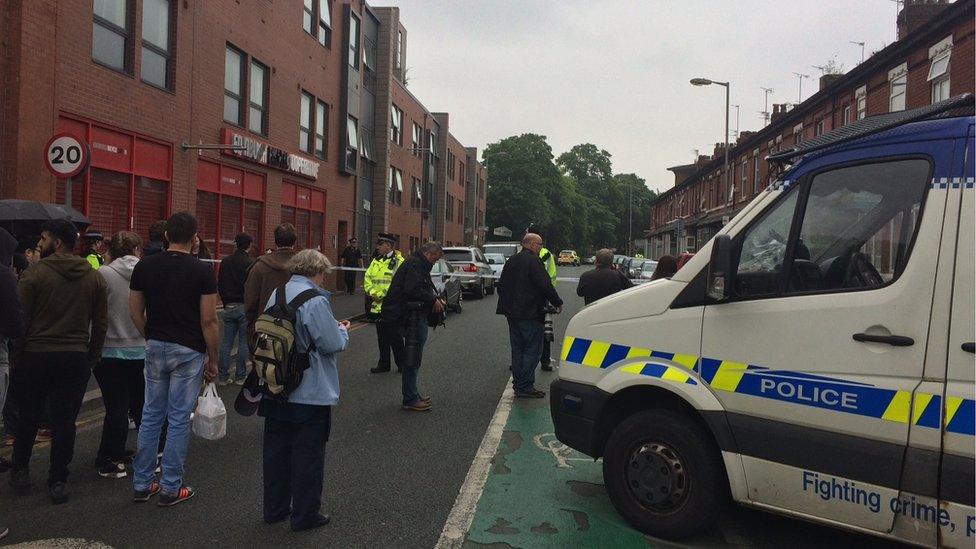
Police have placed a 100m cordon near Banff Road
Police investigating the Manchester bombing have found a car they say may be "significant" to their inquiry.
Officers evacuated an area of the city while they assessed the white Nissan Micra in Rusholme. The cordon has now been lifted and the car removed.
The BBC has also learned that bomber Salman Abedi visited a jailed British-Libyan convicted of terrorism offences in the months before the attack.
Counter-terrorist police were aware of the visits but chose not to block them.
Abedi killed 22 people at Manchester Arena on 22 May.
Speaking about the car find, Det Ch Supt Russ Jackson said it was "potentially a significant development".
"We are very interested in anything people can tell us about the movements of this car, and who was in it, over the past months," he added.
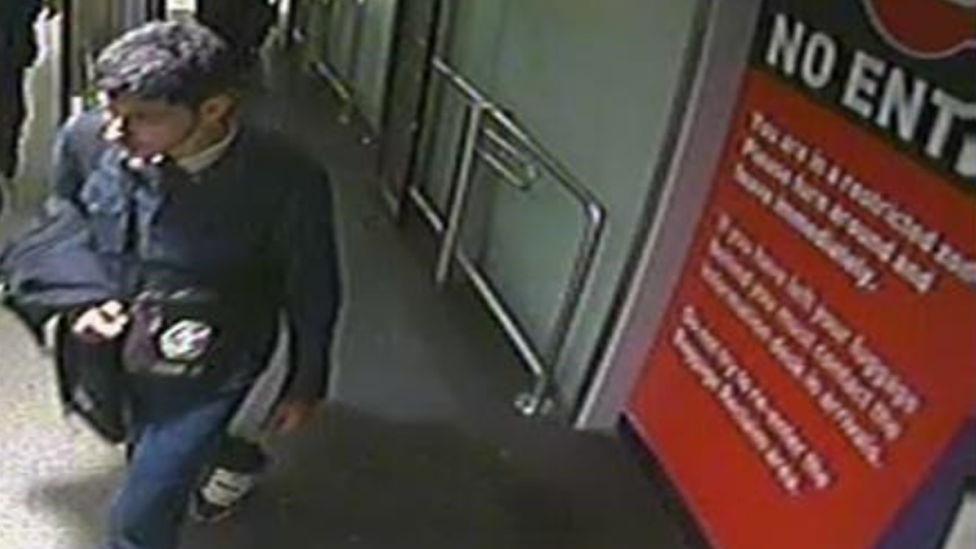
Police have released new images of Salman Abedi
Forensics and bomb disposal units were seen leaving the area at about 17:30 BST. The vehicle was seized at Devell House, and a search is continuing.
A 100m cordon, which had been in place since the discovery on Friday morning, was lifted at about 20:00 BST.
"We are also interested in any information about who may have had access to the car or who may have gone to and from it."
The Manchester Royal Infirmary remained open but people had been evacuated from Ronald McDonald House, which accommodates families of patients at the Royal Manchester Children's Hospital.
Police also released new CCTV images, external of Abedi before the attack at Manchester Arena.
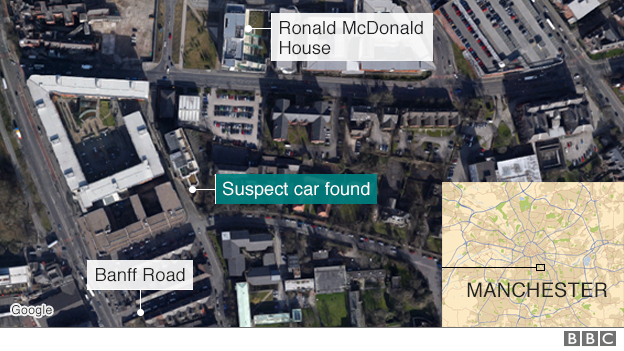
The BBC has learned that Abedi visited Abdal Raouf Abdallah at Altcourse Prison in Merseyside twice in March.
Abdallah was sentenced to five-and-a-half years in July 2016 after trying to help four people - including an RAF veteran - to travel to Syria to fight with militants against the Assad regime.
Abedi's visits to Abdallah - who was left paralysed after fighting during the 2011 Libyan uprising - were known about by the prison authorities and counter-terrorism officers.

Analysis by Danny Shaw, home affairs correspondent
Every week across the UK thousands of people visit relatives and friends in jail.
It's a major logistical and security exercise, particularly if they're visiting one of the 150 offenders imprisoned for terrorism-related offences.
These visits have to be approved by counter-terrorism officers, who can prevent them if they have concerns.
Salman Abedi, however, was allowed to go ahead with his visit, a decision which is likely to be scrutinised as part of a review into the handling of his case.
Nevertheless, it's understood Abedi was closely monitored when he met Abdal Raouf Abdallah; staff have the capability to listen into prisoners' phone calls and examine their mail, so it would be surprising if they didn't apply the same rigour during visits to prisoners convicted of terror offences.
The key question is whether any useful information emerged and if it was passed onto MI5 whose list of former 'subjects of interest' included Abedi.

On Friday Greater Manchester Police said they had so far found no record of any calls to the anti-terrorist hotline about Abedi.
After the attack, a community worker said two people had made separate calls to the hotline about five years ago to raise concerns about his behaviour.
Meanwhile, two of the bomber's cousins have said they had no idea he was planning his attack.
Isaac and Abz Forjani were arrested by police after the attack - and were questioned for a week - but have since been released without charge.
They say they did not know about Abedi's extremist views - adding that he may have been radicalised abroad.
Salman Abedi's cousins say the bomber "betrayed his family"
Isaac, 24, said: "It's not easy being connected to 22 lost, innocent lives.
"The fact that the person that did this is related to us by blood is something that's going to stay with me for the rest of my life.
"My thoughts are with the families of the victims. I really do feel for them.
"We went in, we could come out, we can try and move on with our lives. They've lost their loved ones."
The two brothers said they last saw Abedi three months before the attack, when he got his hair trimmed at Abz Forjani's barber shop.
Abz, 21, said he had a "pretty close relationship" with Abedi. He said his cousin was not part of "a big network".
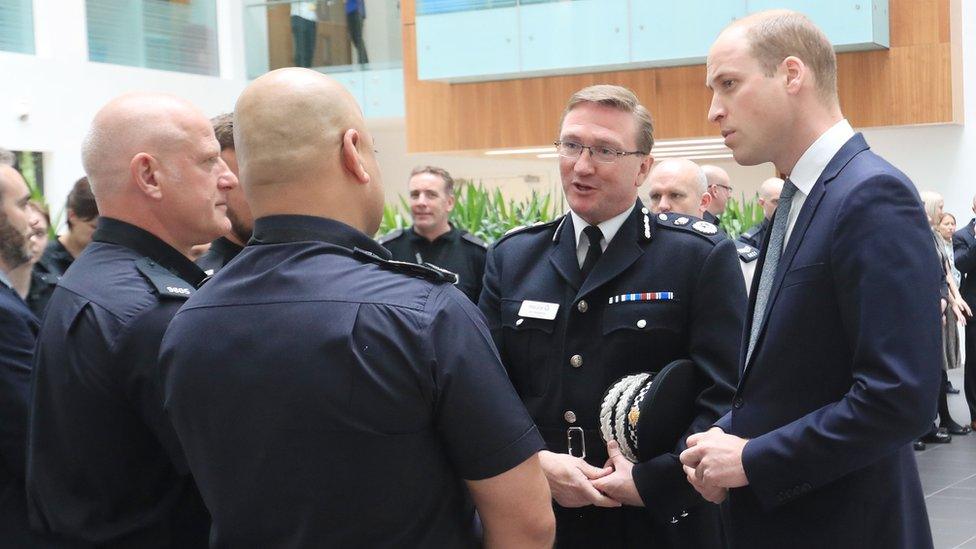
Prince William is meeting first responders who worked through the night after the attack
He said: "I believe it was all done by one man, (who) developed some sort of thoughts in the past few years which he kept to himself, secretly to himself.
"He never shared it with any members of the family - if he would have, we could have done something to stop that happening.
"He never admitted extremist views - it was just political opinions, so it wasn't focused or aimed at a particular group," Abz added.
"The thought was he was just a religious man taking it way too far, becoming judgemental maybe.
"There's never been a hint of extremism."
The brothers also insisted they shared the same British values as everyone else.
"We're Mancunians ourselves," said Isaac.
The pair's younger brother Alharth, 19, is still in custody.
Sixteen people have been arrested over the bombing at an Ariana Grande concert and 10 remain in custody.
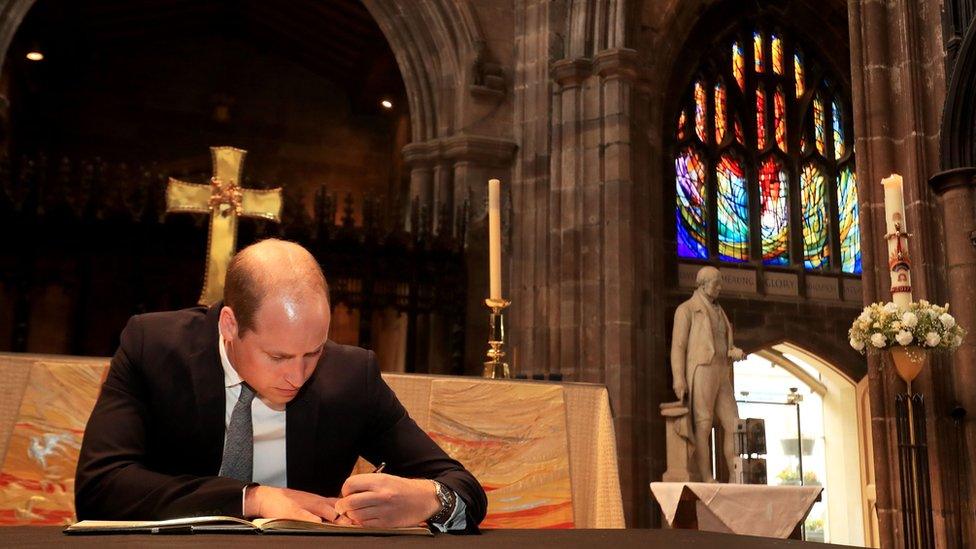
Prince William signed a book of condolence at Manchester Cathedral
The Duke of Cambridge has visited the city to meet some of the police officers who were first on the scene following the attack.
Prince William met Chief Constable Ian Hopkins on his visit to the Greater Manchester Police headquarters, before speaking to some of the first officers to attend the area after the bomb went off.
He also met taxi drivers and other members of the community who responded to the attack during a visit to Manchester Cathedral, where he signed a book of condolence.
His visit comes after the Queen visited the Royal Manchester Children's Hospital, where some of the 116 people injured in the attack were being treated, last week.
Inquests into the deaths of victims of the Manchester attack will be opened on 9 June and adjourned, pending a police investigation.